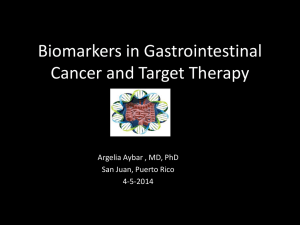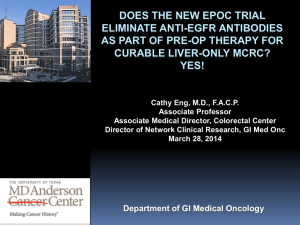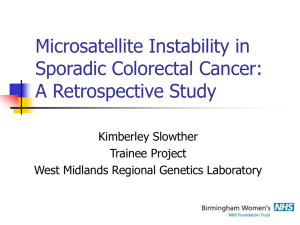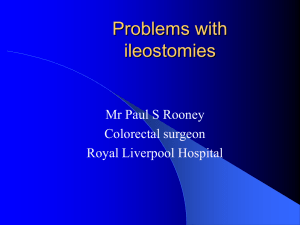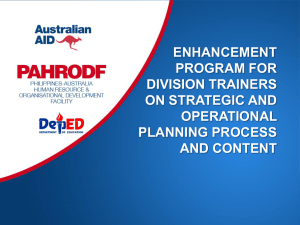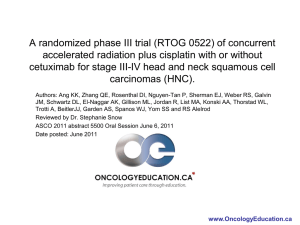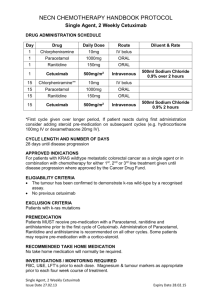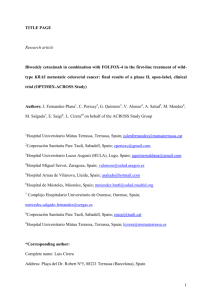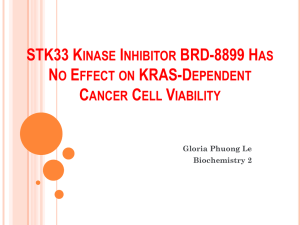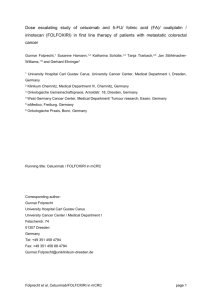Identification, molecular characterization, clinical
advertisement
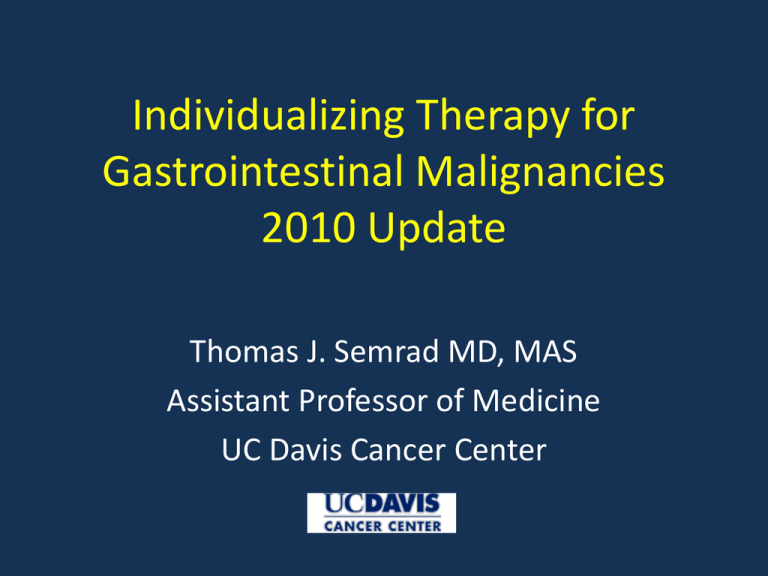
Individualizing Therapy for Gastrointestinal Malignancies 2010 Update Thomas J. Semrad MD, MAS Assistant Professor of Medicine UC Davis Cancer Center Disclosure • Consulting or Advisory: Genomic Health, Inc Individualizing Therapy in Colorectal Cancer • Tumor – MSI – KRAS, BRAF, and others • Host – Pharmacogenetics Colon Cancer Is More Than One Disease Chromosome Instability: 85% Microsatellite Instability: 15% KRAS Mutation: 40% BRAF Mutation: 10% CIMP Watch this Space!!! Microsatellite Instability (MSI) • Defective DNA Mismatch Repair (dMMR) Nature Reviews Cancer 2004;4,769-780. MSI Identifies a Subset of Stage II and III Colon Cancer with a Lower Risk of Relapse MSI MSS Untreated Patients JCO 2010;28:3219-3226 MSI Predicts for Lack of Benefit from Adjuvant 5FU Stage II Stage III MSI MSS JCO 2010;28:3219-3226 E5202 mFOLFOX6 High Risk (MSS and 18qLOH) Surgery R mFOLFOX6 + bevacizumab Tumor Block Risk Assessed Based on MSI / 18q LOH Low Risk (MSI or no loss 18q) Observation Accrual Goal 3,125 Adjuvant 5FU: QUASAR Lancet 2007;370:2020-2029 RT-PCR for RNA Quantification from Fixed Paraffin-Embedded Tumor Tissue Reporter Forward Primer R Probe Quencher Q Polymerization Reverse Primer R Q Strand Displacement and Cleavage of Probe Q R Polymerization Completed Clark-Langone, BMC Genomics: 2007; 8:279. Cronin et al. Am J Pathol. 2004;164:35-42. QUASAR: Pre-Specified Primary Endpoint: Recurrence Risk Is there a significant relationship between the risk of recurrence and the pre-specified continuous Recurrence Score in stage II colon cancer patients randomized to surgery alone? RECURRENCE SCORE Calculated from Tumor Gene Expression STROMAL FAP INHBA BGN CELL CYCLE Ki-67 C-MYC MYBL2 GADD45B REFERENCE ATP5E GPX1 PGK1 UBB VDAC2 Kerr et al., ASCO 2009, #4000 QUASAR Results: Colon Cancer Recurrence Score Predicts Recurrence Following Surgery Prospectively-Defined Primary Analysis in Stage II Colon Cancer (n=711) 35% Risk of Recurrence at 3 years 30% 25% 20% 15% 10% p=0.004 5% 0% | | 0 ||| || | | | | |||| ||| ||||| ||||||||||||| |||| ||||||||| ||||||||||||||||||||||||||||||||||||||||||||||||||||||||||||||||||||||||||||||||||||||||||||||||||||||||||||||||||||||||||||||||||| ||||||||||||||| ||||||||||||| ||||||||| ||| || | || ||||||| | | | |||| | 10 20 30 40 50 60 | 70 Recurrence Score Kerr et al., ASCO 2009, #4000 QUASAR Results: Recurrence Score, T Stage, and MMR Deficiency are Key Independent Predictors of Recurrence in Stage II Colon Cancer Kerr et al., ASCO 2009, #4000 Nature Reviews Cancer 2009; 9, 489-499 Mutated KRAS Predicts Absence of Benefit From EGFR-Targeted Antibodies Mutated KRAS Wild-type KRAS N Engl J Med 2008;359:1757-65 What We Thought We Knew: CRYSTAL N Engl J Med 2009;360:1408-17 Cetuximab Does Not Improve DFS in Stage III CRC JCO 28:15s, 2010 (suppl; abstr 3508) MRC COIN Cetuximab and Oxaliplatin • Advanced Colorectal Cancer, first line therapy • No Prior Chemotherapy for Metastatic Disease • PS 0-2 • Good Organ Function • No prior EGFR IHC A 5FU or capecitabine Oxaliplatin Second Line Therapy: Irinotecan based Primary Endpoint: B C 5FU or capecitabine Oxaliplatin Cetuximab 5FU or cap Oxaliplatin 5FU or cap Oxaliplatin Overall Survival in KRAS wild-type Secondary Endpoints: OS in KRAS mutant OS in “all wild-type” PFS, RR QOL Health Economics 12 Weeks OxMdG: mFOLFOX6 with slightly different LV CapOx: Oxaliplatin 130mg/m2 D1; Capecitabine 1000mg/m2 D1-14 every 21 days, reduced to 850mg/m2 July 2007 due to toxicity CapOx or OxMdG chosen before randomization; N=815 per arm JCO 28:15s, 2010 (suppl; abstr 3502) JCO 28:15s, 2010 (suppl; abstr 3502) Biomarkers Total 1316 Population N Arm A Arm B 1630 815 815 Assessed for mutation 1316 (81%) 648 668 KRAS mutated 565 (43%) 268 297 BRAF mutated 102 (8%) 57 45 NRAS mutated 50 (4%) 18 32 KRAS wild-type 729 (55%) 367 362 “All wild-type” 581 (44%) 289 292 ITT All WT 581 KRAS 565 BRAF 102 NRAS 50 KRAS & NRAS 11 JCO 28:15s, 2010 (suppl; abstr 3502) Median Overall Survival (Months) COIN: Survival by Subgroup JCO 28:15s, 2010 (suppl; abstr 3502) COIN: Response Rates KRAS WT KRAS Mutated Arm A Arm B Arm A Arm B N 367 362 268 297 ORR at 12 weeks 50% 59% 41% 40% Odds Ratio (B vs. A) Overall Response Odds Ratio (B vs. A) OR 1.44 P = 0.015 57% 64% OR 1.35 P = 0.049 OR 0.97 P = 0.877 46% 43% OR 0.88 P = 0.449 JCO 28:15s, 2010 (suppl; abstr 3502) ??? Front Line Chemotherapy Plus EGFRTargeted Antibody - KRAS Wild Type P-value PFS (months) P-value OS (months) P-value 57 1.44 8.6 0.959 17.9 1.037 + cetuximab 64 0.015 8.6 0.60 17.0 0.68 CRYSTAL FOLFIRI 40 2.07 8.4 0.696 20.0 ASCO GI 2010 N = 1198 0.796 + cetuximab 57 <0.0001 9.9 0.0012 23.5 0.0093 OPUS FOLFOX4 37 2.544 7.2 0.570 NR 7.7 0.0163 NR Trial Arm RR (%) MRC COIN OxFdG / XELOX ASCO 2010 N = 1630 OR HR HR NA JCO 2009 N = 337 + cetuximab 61 0.011 PRIME FOLFOX4 48 8.0 0.80 19.7 ASCO GI 2010 N = 1183 NR 0.83 + panitumumab 55 0.07 9.6 0.02 23.9 0.07 CAUTION: CROSS TRIAL COMPARISONS!! BRAF Mutation: Prognostic and/or Predictive? BRAF Mutated Trial CRYSTAL Combined CRYSTAL & OPUS Arm RR (%) FOLFIRI 15 + cetuximab 19 Chemotherapy 13 + cetuximab 22 OR P-value NR 0.9136 1.6 0.4606 PFS (months) P-value OS (months) P-value 5.6 0.934 10.3 0.908 8.0 0.8656 14.1 0.7440 3.7 7.1 HR 0.69 0.267 9.9 14.1 HR 0.63 0.079 KRAS and BRAF Wild Type Combined CRYSTAL & OPUS Chemotherapy 49 + cetuximab 61 2.27 <0.001 7.7 10.9 0.64 <0.001 21.1 24.8 0.84 0.041 JCO 28:15s, 2010 (suppl; abstr 3506) www.abcam.com Predictors of Benefit from Bevacizumab in Colon Cancer ?? VEGF Pathway Polymorphisms JCO 2005; 23: 7342-7349 JCO 2009; 27: 5519-5528 N9741 JCO 2010; 28: 3227-3233 Pharmacogenetic Hypotheses Can Be Tested in Cooperative Group Trials JCO 2010; 28: 3227-3233 Conclusions: I • MSI – Prognostic in Stage II and III – Predicts lack of benefit from 5FU in Stage II • KRAS mutations – Predict lack of benefit from cetuximab • BRAF mutation – May NOT be a good predictor for lack of benefit from cetuximab – Suggests an awful prognosis Conclusions: II • No evidence for benefit of either bevacizumab or cetuximab in adjuvant setting • Does cetuximab combine better with irinotecan than oxaliplatin? • Pharmacogenetic data is needed from cooperative group trials
